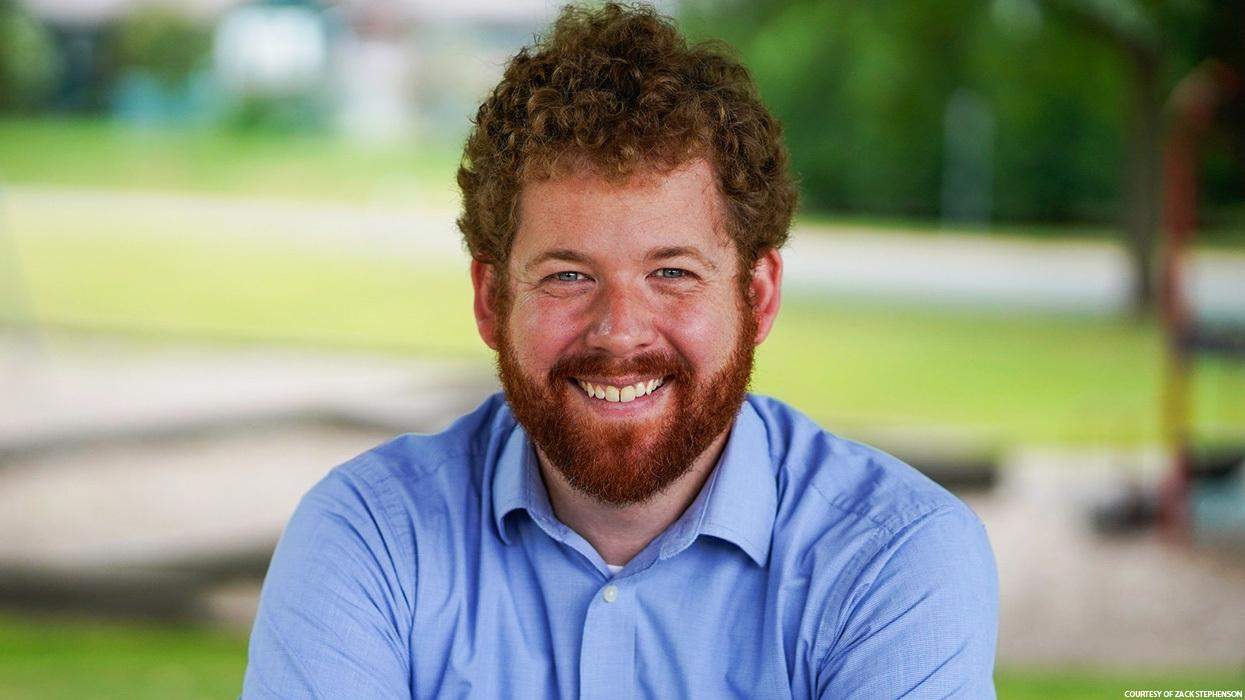In the winter of 2006, my girlfriend and I took the Amtrak from Chicago to Washington, D.C. She was finishing up college in rural Illinois and I had just finished working on a political campaign in Minnesota. The trip was equal parts an opportunity to spend time together and a chance for me to meet her father. Somewhere along the way, I told her that I was bisexual. I was 22 years old, and this was the first time I said those words out loud to another human being. I wouldn’t tell anyone else for another 13 years. Later along that same train trip, we decided to get married.
Five years earlier, while I was still in high school, I attended a wake at a funeral home in Anoka, Minn. There was an open casket, which I approached with trepidation. When I looked inside, I saw my friend Erik, wearing a short-sleeved button-down shirt with bull's-eye logos all over it. One of his favorites. His neck was still bruised from the rope he had used to hang himself the week before.
Erik was the first out gay person I knew who was my own age. He died by suicide during my junior year. The fact that the Anoka-Hennepin School District, where Erik and I both attended high school, was toxically homophobic in the 1990s and 2000s is well documented. In fact, 10 years after Erik’s death, I was on the legal team that sued Anoka-Hennepin Schools for violating federal and state law by failing to protect students from pervasive anti-LGBTQ harassment by students and staff. As an adult, I know that suicide is rarely a matter of simple cause and effect. But as I stood in that funeral home, I was convinced that Erik died because he was gay; because he was harassed, bullied, and even physically assaulted by our classmates.
When I was a teenager and young adult, my mind was deeply conflicted. I couldn’t figure out if I was gay, straight, or bisexual. I certainly couldn’t decide what to do with whatever conclusion I reached. Even after I graduated from high school and went off to a very progressive liberal arts college, where I was surrounded by accepting people with liberal political beliefs and where there were many out gay students and staff living their lives with relative comfort, being anything but straight still felt incredibly unsafe to me. That danger had been burned deep into me through years of witnessing verbal and physical abuse of anyone perceived to by gay.
It wasn’t until I was about 30 that I began to feel comfortable with my sexual orientation. By then, I had been married for six years and was the father of two daughters. I was working as a lawyer in private practice, with no designs on returning to politics. Given my traditional family and masculine personality, I appeared to the world as a straight male. And I convinced myself that was the right thing. Oddly, I felt I wasn’t entitled to identify as bisexual. Though I had physical encounters with men before I started dating my wife, I had never been in a relationship with a man, and given my happy marriage, I probably never would. I thought it would be exploitive, inauthentic, and unnecessarily disruptive to come out as bisexual. I decided it was no one’s business but my own.
I did not seriously revisit the subject when I decided to run for office in 2017. But in the years since, it has weighed on me more and more. The truth is, there are many bisexual people in long-term committed relationships with people of the opposite sex. As an elected member of the Minnesota House of Representatives, I have the opportunity and, frankly, the obligation to show that. And with unified Democratic-Farmer-Labor control of state government and a record-shattering 13 LGBTQ+ legislators, I hope my story will contribute to many critical policy changes, from ending conversion therapy to protecting transgender Minnesotans to making sure young people have access to the mental health resources they need.
But that isn’t really why I am doing this.
I sometimes think back to the person I was in high school. I had loving parents and a great group of friends who I know would have accepted and embraced me if I had come out. But I didn’t, and in fact went to great lengths to conceal my feelings. I just didn’t know very many people who were anything but straight. And the few people I did know were outcasts, subject to endless harassment and sometimes violence. I can remember sleepless nights full of internal struggles. If being open about my own sexuality helps even one other person avoid feeling the way that I felt back then, it is worth it to me to tell this part of my story, regardless of the consequences for my own professional and political life.
Erik and I weren’t close. Friend might even be a stretch. We were in school and band together. I remember his incredible performance as the dentist in the school’s version of Little Shop of Horrors. I don’t remember ever hanging out with him apart from school or band. But I have vivid memories of that night in that Anoka funeral home. Of how I felt. Of being alone. Of being unsafe.
Perhaps if there had been another person in my life who was openly gay or bisexual, it might have been different. Perhaps by coming out, I can make it different for someone else.
Zack Stephenson is a member of the Minnesota House of Representatives.
Views expressed in The Advocate's opinion articles are those of the writers and do not necessarily represent the views of The Advocate or our parent company, equalpride.















Charlie Kirk DID say stoning gay people was the 'perfect law' — and these other heinous quotes
These are some of his worst comments about LGBTQ+ people made by Charlie Kirk.